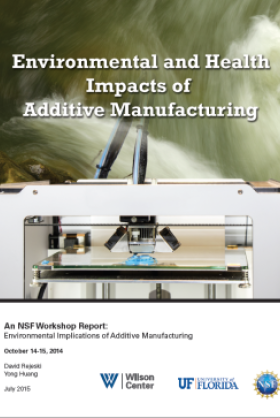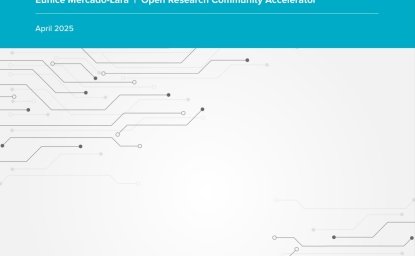Environmental and Health Impacts of Additive Manufacturing


On Oct. 14-15, 2014, the Science and Technology Innovation Program at the Woodrow Wilson International Center for Scholars and the Center for Manufacturing Innovation at the University of Florida sponsored a workshop at the National Science Foundation (NSF) to explore the environmental and human health implications of the growing field of additive manufacturing. This workshop was designed to build on a previous NSF-funded workshop held in July 2013, “Frontiers of Additive Manufacturing Research and Education.” The October 2014 workshop explored five areas of additive manufacturing: lifecycle impacts, occupational health, energy use, waste and cross-cutting/policy issues.
After the workshop, an online survey was sent to the presenters and participants to help rank the identified research areas. This report summarizes the research questions discussed at the workshop, combining additional input from the discussion leaders and the results of the online survey. The participants identified the following areas where further research is needed to better understand the potential environmental implications of additive manufacturing.
Lifecycle Assessment Issues: Research is needed into the supply chain footprint of additive manufacturing and the methodologies needed to compare entire pathways, from material extraction to finished product. There was also interest in a standardized assessment of process energy consumption for additive manufacturing. This research should utilize plausible scenarios looking towards the future of additive manufacturing methods.
Occupational Health Issues: There is a need for better risk assessment and management research related to additive manufacturing, including the toxicology of emissions, exposure control approaches and exposure assessment. This work could include the development of “Safer by Design” principles, tools and approaches for additive processes.
Energy Use Issues: Research is needed into new materials, quantifying the energy impacts of the products of additive manufacturing and developing standardized methodologies to compare energy use of additive with conventional manufacturing processes. This work might include consideration of lightweight materials, batteries, insulation or energy production technologies.
Waste Issues: There is a need for research into management at the end of life of products made with additive manufacturing, in addition to work on industrial production waste and whether novel shapes, products and parts made possible by additive manufacturing pose unique challenges for waste management.
Cross-cutting and Policy Issues: A variety of research policy research needs were identified, particularly further research into the regulatory implications of bio-printing. Other areas identified include risks unique to additive manufacturing in “desktop” settings, liability for different types of users in different settings (schools, job shops, etc.), the use of lifecycle analysis by different constituent groups and the public perception of various uses of additive manufacturing.
The archived workshop website can be found here: http://nsfamenv.wilsoncenter.org/
Authors

Former Director, Science and Technology Innovation Program, Wilson Center

Science and Technology Innovation Program
The Science and Technology Innovation Program (STIP) serves as the bridge between technologists, policymakers, industry, and global stakeholders. Read more

Explore More
Browse Insights & Analysis
360° View of How Southeast Asia Can Attract More FDI in Chips and AI


